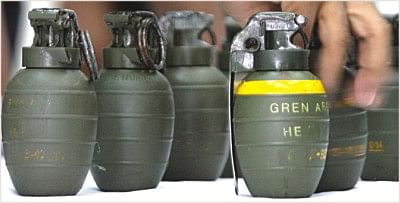Arges all available

The recent recovery of 10 Arges grenades in Sherpur is an eye-opener for the law-enforcement agencies as for the first time criminals other than Islamist militants are held with such deadly weapons.
Besides, investigators suspect apart from the militants, local criminals are also smuggling and trading in the Arges grenades in the country.
An official from elite Rapid Action Battalion (Rab), which recovered the grenades Sunday, says they had earlier recovered over five dozens similar grenades, all from banned Harkat-ul-Jihad-al Islami (Huji) men, in last three years.
Earlier, Rab had the impression that only Huji in the country had excess to smuggling of Arges grenades to use those for their terror activities.
The crime busters have primarily confirmed that the recently recovered grenades have no links to the militants.
The Rab recovered 10 Arges grenades during a drive in a bordering village of Sherpur Sunday night and arrested three people including two indigenous youths.
Rab sources say the name of the manufacturer was deleted from the grenades but they have been confirmed through examination that those were made in Pakistan.
The sources add the grenades recovered earlier were also manufactured in Pakistan.
"Because of explosions we could not detect the manufacturing country of the Arges grenades used in the attacks in 2004 on the British envoy, Awami League leader Suranjit Sengupta, Sylhet Mayor Badruddin Ahmed Kamran and former finance minister SAMS Kibria in 2005," says a source.
"Since the attacks were carried out by Huji, we now strongly believe those grenades were also manufactured in Pakistan," the source adds.
Though several grenades were exploded in the August 21, 2004 attempt on then leader of the opposition Sheikh Hasina, some unexploded grenades recovered from the crime scene were Pakistan-made, the source points out.
The Rab recovered 41 Arges grenades from southwestern district Satkhira on February 15, 2008 and 15 more from Jhenidah on October 29, 2007. The force also seized a few others from Narsingdi, Dhaka's Amin Bazar and even from Sherpur before the recent recovery.
Prior to formation of Rab, police recovered 20 grenades from Kuril Badda in the capital in November 2003.
The sources say all the earlier recovery is similar to those recovered from Sherpur Sunday.
Maj Momtazur Rahman, deputy director of the Rab Bomb Squad, told The Daily Star: "This time the Arges grenades have not been recovered from Huji men and the arrestees were going to sell those to local clients."
"We're now investigating who alongside Huji are smuggling in and purchasing Arges grenades to conduct subversive activities," Maj Momtaz added.
The three arrestees from Sherpur have been put on police remand, and the interrogators believe they would reveal important information.
A number of sources say initial information suggests the arrestees from Sherpur are traders of Arges grenades and they collected those from Indian insurgent group Ulfa to sell each at Tk 10,000 or more.
The statement of an accused in the 10 truckloads of arms haul case in Chittagong said those arms, ammunition and explosives were meant for Ulfa. The accused also said Bangladesh is being used as a route to pass weapons to Ulfa in India and also for fighting in Kashmir.
A source says there are some people in different places in Bangladesh behind smuggling of grenades for Huji men. The investigators suspect many grenades are still in possession of Huji.
The Huji members mastered the use of Arges grenades when they went to Pakistan and Afghanistan for training, says a source in the banned outfit.
In South Asia, Arges grenade, a military weapon, was widely used in Afghanistan, Bangladesh, India and Pakistan by the terrorist groups in some major attacks in the last two decades and gradually became the most popular weapon.
As the first recovery of Arges grenade was made in 2003, the investigators suspect Huji men had started smuggling in grenades in Bangladesh during the rule of BNP-Jamaat-led alliance government.

 For all latest news, follow The Daily Star's Google News channel.
For all latest news, follow The Daily Star's Google News channel. 



Comments